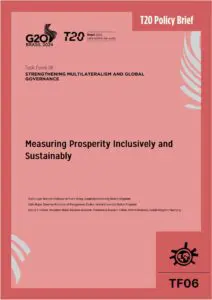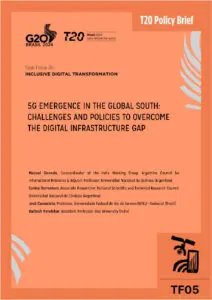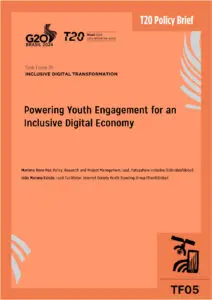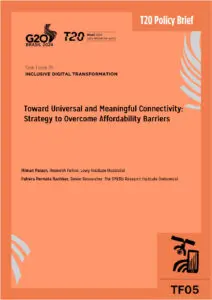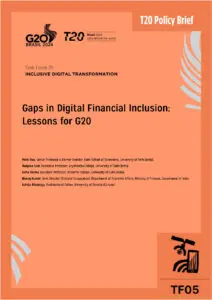The workforce shortage and gender disparity in cybersecurity profession pose a greater risk to the digital economies from cyber adversaries. The global efforts and initiatives for women to pursue career in cybersecurity field tend to be lesser than men along with various societal barriers, which consequently result in their underrepresentation and underutilization in cyber industry. The G20 states and other nations equally share the cyberspace and therefore need to collaborate and complement efforts to address gender disparity in cybersecurity profession. Providing education, training, entrepreneurship, and equal opportunities to women in cybersecurity would help to build a safe and resilient cyberspace and would also contribute to their socio-economic empowerment.
Challenge
Cybersecurity is becoming one of the greatest challenges of the modern digital era and cyber-attacks are the top 10th risk for doing businesses in the globe (The Global Risks Report, 2020). During the current unprecedented situation of COVID-19, there is an unparalleled increase in the usage of internet through teleworking, online shopping, and distance education, which leaves the organizations and individuals at the mercy of cyber criminals. Consequently, the demand of cybersecurity tools, technology and skilled personnel has been increased exponentially in the world. However, the cybersecurity industry faces a growing shortage of skilled and diverse professionals to address the immeasurable cybersecurity risks and challenges. It is estimated that there would be 3.5 million vacant cybersecurity jobs by 2021 around the world, which means that the global demand for cybersecurity workforce needs to grow at a staggering rate of 145% each year just to meet the shortage of skilled professionals (Cybersecurity Jobs Report 2018-2021). Thus, it becomes a grand subject for the global stakeholders to meet this demand of talent in building a resilient, secure, and safe cyberspace.
On the other hand, cybersecurity is unfortunately a male-dominated field around the world. According to a study, women in North America represent a mere 14% of the total cybersecurity workforce, while in Europe, it is up to 7% and in the Middle East, it touches up to only 5% which is alarming for the global cyber industry (Reed et al., 2017). It is estimated that if the number of women professionals working in cybersecurity equals that of men, the economic footprint of cybersecurity industry could increase by USD 30.4 billion in the USA and £12.6 billion in the UK (Opportunity in Cybersecurity Report 2020). Talent, regardless of gender, has been considered as the new capital in the modern world, therefore empowering women in all professions is important to drive innovation and leverage their untapped talent for socio-economic prosperity (Klaus Schwab, 2012).
According to a study, the organizations which greatly increase employment and leadership opportunities for women, have shown increased organizational effectiveness and growth (McKinsey & Company, 2017). In addition, it is estimated that organizations with three or more women in senior management functions score higher in all dimensions of organizational performance. These studies are a good indicator to encourage organizations to attract women at work and provide them with equal and inclusive opportunities to improve the overall organizational performance and culture (Iqbal & Khan, 2019). Hence, it is imperative and in the favor of hyper-connected G20 states and rest of the world to overcome this gender disparity in the cybersecurity profession to meet the global and skilled cyber workforce demand.
Proposal
Women’s equality and empowerment is one of the 17 Sustainable Development Goals of the United Nations, which give them a fundamental right to have control over their lives to put forth impact and influence on society. Diverse and inclusive human capital is considered as a key pillar in the prosperity and competitiveness of any society. Business organizations and nations cannot achieve competitiveness and sustainable growth without mobilizing and including women in their workforce. It is estimated that gender gap in the workforce costs a nation around 15% of the total GDP (Cuberes & Teignier, 2016). On the other hand, women hardly sit on the top leadership positions of global organizations. In 2019, only 33 women, 6.6% of the total, were CEO’s of the Fortune 500 companies (Christine, 2019).
Gender gap and non-inclusion of women in cybersecurity profession is alarming and require to study reasons and develop strategies to build more diversified and inclusive workforce capable of addressing cybersecurity challenges with their male counterparts. It is also important to remove the stigma that cybersecurity is a gender-specific field, and there is a need to change the perception that it is a purely computer science discipline. Therefore, it is highly recommended to take key actions to avoid any serious impact on the world’s digital assets due to the scarcity of skilled and gender-unequal cybersecurity workforce, which is considered as the first line of defence to protect connected systems and critical infrastructure from cyber adversaries.
In the following, a set of evidence-based recommendations are presented, which could help the G20 member states to work on overcoming the gender disparity in cybersecurity profession.
- Setup Cybersecurity Vocational Education and Training Programs for Women
Education, skills, training and knowledge are the driving forces of economic growth and social development of a nation (World Development Report, 2019). The flexibility between general and vocational education is imperative to enable workers, especially women to compete in changing labor markets where technology plays an increasingly vital role (Park, 2019). Vocational training programs could play a vital role in developing skills and confidence in women from rural, low income, economically and socially backward families and help them to achieve economic, professional and social independence (Jo et. al, 2016).
Providing women with vocational education and skill-based training in the field of cybersecurity could prioritize and support their professional development for active participation for widely available jobs e.g. ethical hackers and penetration testers, cyber threat intelligence operators, information security management consultants, and cyber bug bounty researchers, etc. The skill-based trainings include mentorship, short courses, diplomas, and certifications, which may help ensuring that women can be fully engaged and exceled in cybersecurity profession. The G20 could work with private sector and global cybersecurity training organizations to come forward to complement this effort. Teaching materials, tutorials, labs and course contents could be developed with the leading cybersecurity experts and professionals to offer in this program. The G20 states could help the developing and least developed countries by establishing ‘cyber skills development academies’ with the partnership of public and private sectors as well as non-profit organizations. The trainers in the established academies could offer hands-on training with state-of-the-art cybersecurity tools and technologies to develop skills and prepare women for job market. Consequently, this initiative would help women to enhance their technical, economic and social strengths by becoming active cybersecurity professionals to overcome the global cybersecurity gender gaps.
- Support for Women Entrepreneurs in Cybersecurity Industry
If women and men around the world contribute equally as entrepreneurs, the global GDP could ultimately increase by approximately 3% to 6%, boosting the global economy by USD 2.5 trillion to USD 5 trillion (Shalini and Cherie, 2019). In 40% of economies around the world, women’s early-stage entrepreneurial participation is half or less than half of that of their male counterparts (Global Entrepreneurship Monitor, 2017). However, social attitudes and cultural views tend to exert a negative impact on women’s desires and self-confidence to become entrepreneurs and start businesses (OECD, 2016). As discussed earlier, women in cybersecurity profession are in shortage, so do in owing or leading businesses, startups and organizations.
This brings an opportunity for the G20 states to unleash the power and talent of women in cybersecurity industry by increasing the availability of resources including, their skills, entrepreneurship training, financial support and networks. The G20 states need to collaborate and invite leading global cybersecurity organizations and venture capital firms to establish more women-dedicated startup incubators and accelerator programs that could help to stimulate passion in women entrepreneurs and help them to achieve their business growth. It is recommended to create a ‘G20 Cyber Startup Fund’ with private partnership and industry to execute this initiative to support global women entrepreneurs in cybersecurity. This G20 initiative could provide a platform to women with an array of intensive professional development programs such as mentoring, training, networking, and coaching on matters e.g. business scaling, financial management, human resource development, leadership, marketing and sales etc. Closing the gender gap in cybersecurity entrepreneurship and fueling the growth of women-owned cybersecurity enterprises could bring new ideas, services, and products into commercial markets to boost female career development, self-realization, and job creation. Furthermore, some successful stories as the outcome of this G20 sponsored initiative could make inspirational case studies and role models for other women for their motivation and encouragement.
- Launch a Global Cyber Gender-Equity Measurement Initiative
Gender-bias working environment is a leading cause to the unbalance representation of women in cyber industry (Reed et al., 2017). It has been observed that women face discrimination in terms of delays in career development, unconscious bias, pointing out errors, tokenism, and non-inclusion at higher level positions (Iqbal & Khan, 2019). Studies show that gender discrimination is manifested earliest from primary schools in the field of STEM (Tondeur et al., 2016) and it is more aggravated on the basis of cultural behaviors and social beliefs (Nagy et al., 2010). Women also face wage inequality as compared to men and get 3% lower wages at the level of director and 6% on non-managerial and entry level posts (Iqbal & Khan, 2019). Women have shown reservations that employers do not value their opinions and suggestions in the work environment. On the other hand, women who get appreciations from organizations tend to work more firmly and strongly at the level of decision making.
The G20 states could launch an initiative for ‘Global Cyber Gender-Equity’ and engage with other organizations e.g. International Telecommunications Union and World Economic Forum to advocate and promote it through forming a joint working group. A global awareness campaign is imperative to address the issues and an active partipcation of G20 member states and other nations could help to achieve this mission. The G20 could work with the joint working group and mobilize some experts from its engagement groups e.g. B20, S20, and W20 to establish the metrices, protocols, and parameters to develop and promote an index to measure the global cyber gender-equity. The G20 could execute and foster this initiative by developing a web-portal to monitor cybersecurity gender disparity across the globe and demonstrate the readiness of nation states as well as the most immediate actions required to fill the gaps.
- Cooperate with Women’s Global Development and Prosperity Initiative
In 2019, the US government launched a ‘Women’s Global Development and Prosperity initiative’ to advance the global women’s economic empowerment by supporting 50 million women in the developing world till 2025 (W-GDP, 2019). This initiative is built on three pillars; women prospering in the workforce, women succeeding as entrepreneurs, and women enabled in the economy. In its first year, W-GDP has supported 12 million women around the world and has taken bold steps to ram-up the initiative’s policy focus on legal reforms and launching new partnerships with private sector through a generous support. W-GDP is a manifestation of the commitment and determination shown by the US government for the global women empowerment. It is recommended to the G20 to build a working group in coordination with W20, B20, and T20 to explore the collaborative avenues with the W-GDP initiative and establish a framework for awareness campaigns, funding and support to attract women in cybersecurity industry. The working group could work together to define and develop protocols and identify the key performance indicators to evaluate the outcomes of the established program. This initiative could harness the experience of W-GDP and complement the efforts of G20 by engaging a pool of cybersecurity experts and trainers for the sponsored program.
- Protect Women Rights in Cybersecurity Industry
A survey conducted on 19,641 individuals from 170 countries across the world found that women continuously face occupational segregation, discrimination and wage inequality (Reed et al., 2017). The United Nation’s SDG Goal 5 aims to eliminate all forms of discrimination and violence against women in the public and private spheres and to undertake reforms to give women equal rights to economic resources and access to ownership of property. In this manner, employers and organizations have a responsibility to prevent and promptly address discrimination, harassment (including sexual harassment), victimization and bullying against women in the workplace. Violence, abuse, and human rights violations in the workplace could create conditions, which are hazardous to the psychological and physical wellbeing and can demoralize women at work. While gender equality is very important, the uniformity of income, perks and benefits should also be taken seriously in the profession. As per a study, an additional USD 12.7 billion could be added to the US economy if women’s salaries were equal to their male counterparts, a pay gap that currently represents a 17% difference (Opportunity in Cybersecurity Report 2020).
The G20 states could work together to strengthen the legislative processes, laws and regulations to protect women’s rights in cybersecurity industry against bullying, discrimination and sexual harassment. Since it is an ongoing legislative process, therefore it requires effective practices to build transparent protocols and mechanisms to report discrimination, harassment and bullying in the workplace. The G20, in coordination with W20 and L20 engagement groups, could launch an initiative with its members states, which are on the top global ranking with respect to women rights at the workplace to share best practices and experiences. The G20 should also study and establish a common criterion among member states in promoting safe, flexible, female-friendly employment and workplaces for women including, maternity protection, dignity, privacy, personal freedom, and more harmonized work-life balance. Consequently, it would strengthen women’s professional participation and devotion to the organizations they serve.
References
Christine P. 2019, Gender and the CMO: Do the Differences Make a Difference?. Journal of Strategic Marketing, Taylor & Francis, https://doi.org/10.1080/0965254X.2019.1694567
Cuberes D., Teignier, M. 2016. Aggregate Effects of Gender Gaps in the Labor Market: A Quantitative Estimate. Journal of Human Capital, 10(1), 1–32. https://doi.org/10.1086/683847
Cybersecurity Jobs Report 2018-2021, Cybersecurity Ventures, 2018
Global Entrepreneurship Monitor. 2017. Women’s Entrepreneurship Report. [online] https://www.gemconsortium.org/report/49860
Iqbal Z., Khan M.K. 2019. “Saudi Women in Cybersecurity Narrowing the Gap of Human Capital Crisis”, Global Foundation for Cyber Studies and Research, Washington D.C. USA
Iqbal Z., Khan M.K. 2019. ” Global Women in Cyber Workforce”, Global Foundation for Cyber Studies and Research, Washington D.C. USA
Jo T., Sarah V., Hans V., Mieke V.H. 2016. “Gender Differences in the ICT Profile of University Students: A Quantitative Analysis”. Journal of Diversity and Gender Studies, 3 (1), 57-77
Klaus S. 2012. “The End of Capitalism- So What’s Next?”, World Economic Forum, [online] https://www.weforum.org/agenda/2012/04/the-end-of-capitalism-so-whats-next/
McKinsey & Company. 2017. “Women Matter: Time to Accelerate-Ten Years of Insights into Gender diversity”, [online] https://www.mckinsey.com/featured-insights/gender-equality/women-matter-ten-years-of-insights-on-gender-diversity
Nagy G., Helen MGW, Jacquelynne S.E, Ulrich T., Oliver L., and Jürgen B. 2010. “The Development of Students’ Mathematics Self‐concept in relation to Gender: Different Countries, Different Trajectories?”, Journal of Research on Adolescence, 20(2)
OECD (2016), “Policy Brief on Women’s Entrepreneurship”, https://dx.doi.org/10.2767/50209
Opportunity in Cybersecurity Report. 2020. Tessian, UK
Park, C.Y. 2019. Lifelong Learning and Education Policies to Capture Digital Gains. Policy Brief, G20 Insights, [online] https://www.g20-insights.org/policy_briefs/lifelong-learning-and-education-policies-to-capture-digital-gains/
Reed J., Zong Y., Terwoerds L., and Brocaglia J. 2017. “The 2017 Global Information Security Workforce Study: Women in Cybersecurity”, Frost & Sullivan, Santa Clara, USA
Shalini U., Cherie B. 2019. “Want to Boost the Global Economy by $5 Trillion? Support Women as Entrepreneurs”, Boston Consulting Group, USA
The Global Risks Report 2020, 15th Edition, World Economic Forum
UN General Assembly. 2013. “A life of dignity for all: accelerating progress towards the Millennium Development Goals and advancing the United Nations development agenda beyond 2015”, A Report of the Secretary-General, United Nations
Women’s Global Development and Prosperity (W-GDP) Initiative. 2019., https://www.whitehouse.gov/wgdp, USA
World Bank World Development Report. 2019. “The Changing Nature of Work” [online] https://www.worldbank.org/en/publication/wdr2019



